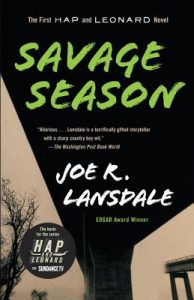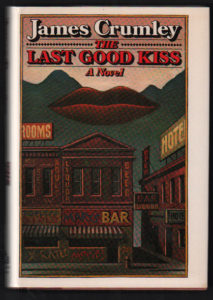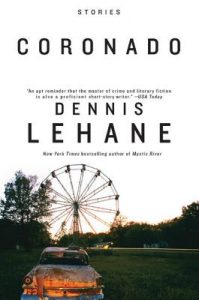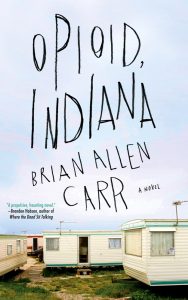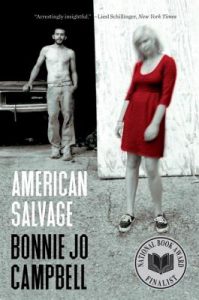When discussing crime fiction, or the more niche term noir, most readers picture the cliché of an unshaven detectives in his rumpled suit, stinking of cigarettes and stale coffee or criminals prowling the shadows under streetlights. The common variable is almost always some city. The idea that stories about homicide, heists and other illicit activities happen far from small town life. That was my perception of the genre, too. Growing up in rural West Virginia, I loved crime fiction, but was dismayed to find most of the stories relegated to urban life.
However, since the days of early noir practitioners like James M. Cain and Jim Thompson, quiet communities have been used by writers to examine the violent aspects of life. In the hands of these writers, murder is just as likely to happen in cornfields or mountain towns. When I was writing The Poison Flood, a novel about a reclusive musician whose small West Virginia town is threatened by the environmental disaster of a toxic chemical spill, I wanted to explore the themes common to rural life like so many of the writers I admired. Here are a couple of my favorite rural noirs.
Winter’s Bone by Daniell Woodrell
Woodrell coined the term “Country Noir” with his novel, Give us a Kiss, but Winter’s Bone is his best known entry in the genre. When Jessup Dolly doesn’t show up for court, Ree Dolly finds out her father used their house as collateral to post bail. If he isn’t found soon, the family will be homeless. The sole caretaker for her younger siblings and disabled mother, Ree must navigate the dangers of her Ozarks home to find her missing father. Along the way, she’ll encounter many secretive, methamphetamine producing relatives and seek assistance from Uncle Teardrop, one of the greatest characters in modern fiction. With Ree Dolly, Woodrell creates an enduring young protagonist destined to be discovered by subsequent generations. Winter’s Bone transcends labels like noir or crime fiction. It’s a novel of immense power, grappling with themes of poverty, addiction and loyalty in ways few works of fiction ever achieve.
The Hap Collins and Leonard Pine Series by Joe R. Lansdale
I couldn’t pick just one. This series about two best friends from eastern Texas was one of the first times I found a novel that showcased diverse characters in a rural setting. Leonard Pine is a gay, African American, Vietnam veteran, and Hap Collins is a straight, white former conscientious objector who went to prison for refusing to fight in the war. Together, they get in trouble and solve a series of mysteries. Lansdale uses the action filled plots to comment on rural American, tackling issues like the exploitation of laborers as well as the racism and homophobia Leonard encounters. The series showed me there was a place for thoughtful fiction that blended important themes and a country setting together without being forced into the tropes of exploitation. One quick tip, the series is twice as rewarding if you read it from the beginning.
The Painter by Peter Heller
Heller’s protagonist, Jim Stegner, is an ex-con and a talented artist who spends most of his days painting, fishing and trying to stay sober. This fragile, yet maintained existence is thrown into chaos when he comes across a man beating a horse during one of his many fishing excursions. The rest of the novel is an episodic journey across the southwest as Stegner deals with guilt, tries to produce decent art, and uses fishing as something more than just escape and just less than holy ritual. Some of the best writing in this novel about violence, guilt and not quite being able to get one’s shit together comes in these quiet moments, standing in the shallows alongside Stegner. Heller seems to be suggesting that even those most ill-equipped at life can produce something of substance with discipline and artistic vision. Or maybe the novel is just highlighting the ways we distract ourselves with narratives about who we are, avoiding the idea that meaning is only whatever we chose to impose on our lives.
Poachers by Tom Franklin
Like a classic western, Poachers, the eponymous novella from Franklin’s tremendous debut collection, is a sort of morality tale set in the southern swamps rather than the grassy plains or rough buttes of the American west. When three brothers notorious for poaching and other acts of violence kill a policeman, they must contend with one of the best creations of modern fiction, a game warden of near infamous reputation who stalks them with a tenacity reminiscent of the best Western white hats. There could be an almost religious morality present with characters presented as either starkly righteous or wicked, but Franklin does not allow things to remain so simplistic. In fact, a sign reading “Jesus is not Coming” signals the convergence of old southern beliefs and the modern disillusionment infecting these impoverished places where Franklin’s characters live. No easy answers, just complicated people in desperate situations.
The Last Good Kiss by James Crumley
“When I finally caught up with Abraham Trahearne, he was drinking beer with an alcoholic bulldog named Fireball Roberts in a ramshackle joint just outside Sonoma, California, drinking the heart right out of a fine spring afternoon.”
Most writers would trade years off their life for a first line like that. Language is the reason to read Crumley. Despite revisiting the book multiple times, the plot where Detective Sughrue chases an alcoholic writer who’s an obvious Hemingway stand-in remains hazy, yet I can perfectly recall the elegant, whiskey-soaked prose. The novel transitions to a road odyssey when Sughrue is hired to find a missing girl, and the great writer follows along because a lonely man must have someone with whom he can share witticisms and sarcasm. Some readers will accuse Crumley of romanticizing all this broken masculinity, but I think the novel does a good job of showing the futility of all the boozing, stoicism, and stifled articulation. Like so many novels featuring tragic men, it’s about the inability to say what needs said. Oh, and I know that I’m cheating a little here, because the destinations aren’t all strictly rural, but there’s enough dusty backroad stops in roadhouses on their journey to Hell that I feel comfortable sneaking it in.
Coronado by Dennis Lehane
All of Lehane’s works are brilliant, but his collection Coronado manages something nearly impossible, a terrific story told in the second person. In “Until Gwen,” the relationship between the story’s You, just picked up from prison in a stolen Dodge, and his father is one of the finest examples of the struggles between unworthy parents and their sons in any genre, perfectly encapsulating how tainted manhood, resentment and plain greed keep two people from loving one another. Each story is a vibrant gem, but the best of the collection is the forty-eight perfect pages of “Running Out of Dog” a novella about a Vietnam veteran who returns home to his small South Carolina town and is hired to assassinate packs of roaming wild dogs. The subtle nuances of the story leave behind the familiar and tired tropes of the fragile warrior while managing to highlight American’s love of gun culture and the mistreatment of our military veterans in interesting ways.
Opioid, Indiana by Brian Allan Carr
Some might argue this isn’t exactly a crime novel, but the destitute town of Opioid, Indiana feels like a victim. Riggle, the seventeen-year-old narrator, offers descriptions of the dirty streets and addicted residents in the same resigned voice as a coroner performing an autopsy. The plot is genius in its simplicity. Riggle has been suspended from school, his uncle is missing, and the $800 dollar rent is due on Friday. We follow him as he searches for is uncle, gets a part time job washing dishes, lusts after his uncle’s girlfriend and suffers the indignities common to an American high schooler. The novel’s most fascinating moments are nightly legends Riggle re-tells himself with a shadow puppet called Remote, an invention of his departed mother. Unconventional at first, the tales start to gain clarity when you realize it isn’t the content that’s important. It’s about a young man trying to keep the memory and conscience of his mother alive in a time when elders have abandoned him.
American Salvage by Bonnie Jo Campbell
This National Book Award Finalist is set in the small towns and frozen fields of Michigan during unforgiving winters. Campbell’s stories deal with the loss of manufacturing, low wages, and the displacement of blue-collar workers. In stories like, “The Inventor, 1972” the title character bears the literal scars from dangerous labor in a foundry, yet still tries to endure and rectify his mistakes. Campbell also deals with American paranoia in stories like “Fuel for the Millennium” where a man prepares for an Armageddon created by Y2K, and the encroachment of drugs into families with stories like “The Trespasser” where a family realizes their cabin has been used to manufacture methamphetamine. The trespasser here is both a literal and metaphorical entity, both a human and the shadow of narcotics seeping into rural life.



